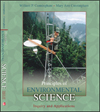Investigating Current Research Problems Scientists exchange ideas and information through scientific journals. Thousands
of these exist, many in very specialized fields. Conservation Ecology
is an important example of a new variety of scientific journals: e-journals,
which you can access on the Worldwide Web. This journal includes research articles,
debates, discussions, and comments from a variety of well respected and active
ecologists, and it covers topics that are very current. Go to the Conservation
Ecology at http://www.consecol.org/Journal/
and look at the most recent issue. 1. Review the table of contents: what are the topics that ecologists are concerned
about today? 2. Look at one of the articles in detail. How does the tone of the article
reflect some of the ideal approaches of science outlined in chapter 1 (hypothesis
testing, cautious inspection of evidence, objectivity)? 3. What kinds of data (or other evidence) are presented in support of the author's
arguments? 4. Some of the articles are debates about a particular topic. Find one of these
and identify the positions on either side of the debate: what is the question
they are debating? describe two (or more) opposing views on the question.
| 


 2002 McGraw-Hill Higher Education
2002 McGraw-Hill Higher Education